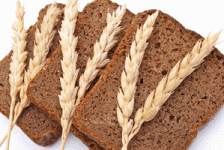Carbs for Lean Muscles
Carbs for Lean Muscle and a Healthy HeartGuest article by Christine Redpath
Healthy eating is essential to a healthy body. This has been part of human knowledge for a long time. In fact, it was Hippocrates who said, "Let food be thy medicine and thy medicine be thy food" over two thousand years ago.
However, in modern times, this has been mostly forgotten in lieu of
foods that are shelf-stable.
Similarly people opt for quick and easy to prepare foods, and appealing
to the eye in terms of packaging.
In response, many fad diets have emerged, many of which descry
carbohydrates as the sole source of excess weight.
Some diets advise to forego carbohydrates altogether.
However, carbohydrates are much more complex in their effects on the
body, and they can, and should, be eaten as part of a healthy diet.
In fact, nutritional experts recommend carbohydrates make up the
majority of a person's daily diet - from 45 to 65 percent.
Anything less than this can result in certain consequences, such as
lower energy levels, brain fog, constipation, and even bad breath.
Understanding how carbohydrates effect the body, and how they fit into
a healthy diet, is key to a holistic approach to health.
Understanding Carbs
Understanding Carbs for Lean Muscle and a Healthy HeartCarbohydrates are complex macromolecules, made up of a variety of molecules, but of which the main building block is a sugar molecule.
Various carbohydrates are essentially chains of sugars - some of which are wildly long and branched, others short and straight.
Simple carbs are highly digestible, and are rich in a short-chain sugars such as fructose (fruit sugar), sucrose (table sugar), and glucose (corn sugar).
They are present in high quantities in processed foods such as white bread, potatoes, white rice, and refined wheat pasta.
Complex carbs contain more complex sugars (longer than three-chain).
It was once thought that simple carbs were bad and complex carbs were bad. However, it turns out to be much more complex than this simple dichotomy.
The truth is that the relationship between carbohydrates and the bodies is complicated, and is related to the way that our digestive systems handle carbohydrates, which in turn has various effects on blood sugar and insulin levels, as well as metabolism and fat distribution.
 The digestive system breaks down (or tries to
break down) carbohydrates into its constituent simple sugars, because
these are the only kind that can pass into the bloodstream and be used
by the body's cells for energy.
The digestive system breaks down (or tries to
break down) carbohydrates into its constituent simple sugars, because
these are the only kind that can pass into the bloodstream and be used
by the body's cells for energy. Here is where it gets more complicated: fiber is part of many unrefined, complex carbohydrates, and it is composed in such a way that it cannot be converted into sugar molecules.
Therefore, it passes through the body undigested. While it may seem counterintuitive, this has a variety of health benefits for the body, including binding to and removing fatty substances as waste, thereby lowering LDL (the bad cholesterol) and improving heart health.
It also plays an important role in regulating the way the body uses sugars, thereby keeping blood sugar levels low and hunger in check. For the average American, 20 to 30 grams of fiber a day are recommended, although most only get around 15 grams.
This interplay between carbohydrate content and its effect on blood sugar can be measured by the glycemic index (GI). Foods that have a lower GI are believed to be better for health and nutrition because they do not cause rapid, short-term spikes in blood sugar and insulin - both factors that are related to higher levels of diabetes, and its associated health problems.
Complex carbs take longer for the body to process due to their molecular complexity, and therefore the energy contained in them is released slowly and consistently, providing fuel for the body that lasts for many hours.
In addition, the high levels of fiber in complex carbohydrates act as buffers against fatty molecules, diminishing likelihoods of developing atherosclerosis, heart disease, and colorectal cancers.
Complex carbohydrates are especially important for people with active lifestyles, such as athletes. Nutritional experts recommend eating a small meal high in complex carbs 45 to 60 minutes before working out. This provides a consistent source of healthy energy to increase muscular efficiency and maximize all the benefits gained fromworking out.
The key to eating carbs for a healthy body is to avoid simple carbohydrates, which are mostly just empty calories - what this means is that they are high in calories while lacking any significant nutritional benefits. It is like eating junk food, and in fact, most junk food is high in simple carbohydrates.
 Complex carbs, on the other hand, are full of
nutritional benefits that the body can use to support overall health.
Complex carbs, on the other hand, are full of
nutritional benefits that the body can use to support overall health. The best sources of complex carbohydrates come from unrefined, unprocessed grains and cereals such as whole wheat bread, wild varieties of rice, and whole grains such as oatmeal.
There are other, cryptic sources of complex carbohydrates, like fruits and vegetables. Some fruits and veggies are exceptionally high in complex carbs, and low on the GI chart, such as figs, nuts, and beans. Low GI foods are important because they actually lower LDL (bad cholesterol) and triglycerides, which are both factors vital for heart health.
Fruit and Vegetables
Fruit and Vegetable Carbs for Lean Muscle and a Healthy Heart Vegetables and fruits are great sources of
complex carbohydrates because they are low in calories and high in
nutritional benefits.
Vegetables and fruits are great sources of
complex carbohydrates because they are low in calories and high in
nutritional benefits. When they are eaten in their natural, unprocessed form, they also provide high levels of fiber.
Many medical studies have made strong connections between diets high in healthy fruits and veggies, and low blood pressure and heart health.
People that eat seven or more servings a day have a far lower risk of developing heart disorders and diseases. The vegetables with the most impact include dark, leafy greens such as collard greens, swiss chard, and kale, as well as broccoli, red bell peppers, green beans, carrots, and brussel sprouts. Healthy fruits include berries, kiwis, bananas, cherries, and pomegranates.
Whole grains are also an essential source of complex carbohydrates, and the less refined or processed, the better. Refining grains involves the removal of the beneficial parts of the grain such as the fiber-rich outer bran and the vitamin- and nutrient-rich inner germ. What is left is nothing more than simple sugars that translate directly as calories.
 Protein is, of course, another essential part of
the healthy diet, and is especially important for athletes.
Protein is, of course, another essential part of
the healthy diet, and is especially important for athletes. Few people realize that by eating select foods, you can gain high levels of protein in addition to high fiber and plenty of healthy complex carbs.
These benefits can all be found in the humble beans, peas, and legumes family of foods.
These should ideally be eaten every day, as the benefits are incredible. They are very easy to include in the diet - sprinkle some edamame beans over a salad for a boost of protein and complex carbs.
Keep hummus dip (made of chickpeas) around for a healthy snack, or make a delicious bean soup or stew for dinner. The variety ensures that a healthy diet high in complex carbs does not have to be boring or repetitive.
In fact, the evidence for healthy carbs supports a healthy body through building lean muscle and strengthening heart health.
For a better understanding of carbs for lean muscle and a healty heart, read this article on carbohydrates definition.
Additional Articles
Glucose Level
Read this other guest article on getting control of you glucose level. If you are diabetic, or at a risk for this disease, then this is a must read article.
Diabetes
Food Pyramid
Understanding the proper foods to eat as a diabetic can help you control your blood sugar levels. Check out the diabetes food pyramid so you can make healthier food selections.
Benefits of Strength Training
Gain lean muscle mass through strength training. This type of workout has many health benefits.
